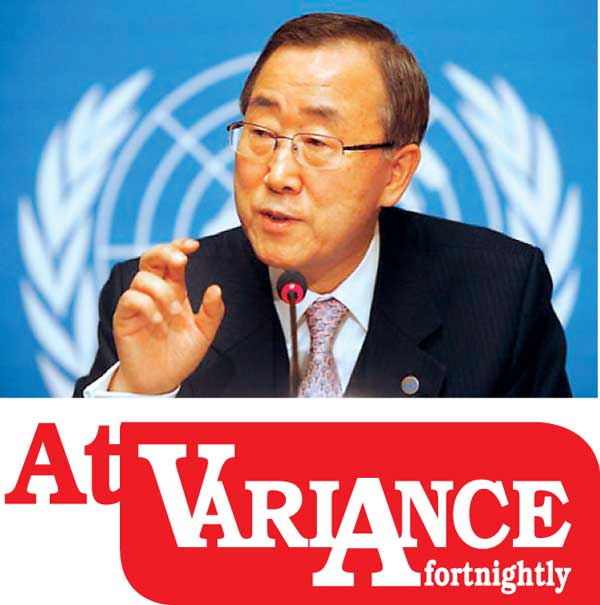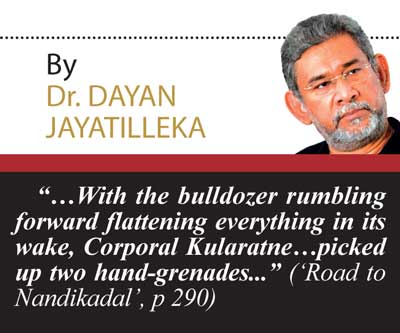Reply To:
Name - Reply Comment
Last Updated : 2024-04-27 08:30:00

You’ve heard of the “We Tamils” (who beat up High Commissioner Ansar). Now we have the “E-Tamils”–the “Eluga/Ezhuga Tamils” (or simply Eelam Tamils?). They shut down Jaffna, took over its streets, raucously demanding federalism, an international investigation and cleansing of the army and Sinhala Buddhist symbolism/presence from the North (thereby turning it into a mono-ethnic enclave). Meanwhile the smooth operators Suma-Sam-Sara-Suren canvass federalism and an internationalized ‘war crimes’ investigation in the corridors of Colombo and Western capitals.
 Quasi-federalism or enhanced devolution will automatically transfer more power to Chief Wiggy and his “genocide jockeys” of the Northern Provincial Council, who will eclipse Sampanthan. The next Northern Chief Minister could be far worse than ex-Supreme Court judge Wiggy. It’s not the person, it’s the place. The place changes the person(s). Eighteen miles from Tamil Nadu with its daily dose of secessionist racist bilge-pumping out from its vernacular media, this Island’s North is permanently a potential Kashmir. Kashmir’s constitutional ‘special status’ which gives it more autonomy than other Indian states, has not kept it peaceful. So why risk conferring more Constitutional power -- including over land -- on our restive, re-radicalized North and East, while eliminating the Executive Presidency, miniaturizing the Governor and reducing the armed forces’ presence?
Quasi-federalism or enhanced devolution will automatically transfer more power to Chief Wiggy and his “genocide jockeys” of the Northern Provincial Council, who will eclipse Sampanthan. The next Northern Chief Minister could be far worse than ex-Supreme Court judge Wiggy. It’s not the person, it’s the place. The place changes the person(s). Eighteen miles from Tamil Nadu with its daily dose of secessionist racist bilge-pumping out from its vernacular media, this Island’s North is permanently a potential Kashmir. Kashmir’s constitutional ‘special status’ which gives it more autonomy than other Indian states, has not kept it peaceful. So why risk conferring more Constitutional power -- including over land -- on our restive, re-radicalized North and East, while eliminating the Executive Presidency, miniaturizing the Governor and reducing the armed forces’ presence?
Chandrika escalated when she called for “a federal system” in her speech to the National Reconciliation Secretariat on the upcoming Constitution, and the PM accelerated when he announced in Jaffna that a draft will be presented to parliament this November. The agenda of drastic dismantling and total remodeling of Sri Lanka is signaled in outgoing UN Secretary General Ban Ki-moon’s farewell speech to the UN General Assembly.
Ban Ki-moon’s speech clubbed Myanmar and Sri Lanka together. Firstly, Myanmar awoke after half-century of military rule. Sri Lanka never experienced this nightmare and maintained a competitive electoral democracy from 1931. Secondly, the Myanmar military failed to completely defeat the various secessionist insurgencies on the country’s periphery; insurgencies which have lasted for decades. Sri Lanka by contrast is a conspicuous success in this regard.
What makes the UNSG’s reference more a danger signal than mere blunder is his bottom-line (to quote from the full official text):“…In both countries, true reconciliation rests on ensuring that all communities, minorities and majorities alike, are included in building a new union.”
The operative words are “building a new union”. Why “new” and why “union”? Anyone educated in Constitutional law, political science, international relations or the English language, rather than dress design, will recognize exactly what this means. A“union” is the concept that underlies the federative principle. Thus Chandrika’s “union of regions” package of 1995/’97.
A unitary state is not a “union”; it is a single unit, a single formation, a single steel shield, a monolith, with or without sub-units which enjoy degrees of autonomy. A “union”by contrast means that separate, autonomous formations have agreed to get together, to converge, and form a union. In short, that which is recognized as distinct, individual, separate and self-governing, opts to come together in a new voluntary contract, “a new union”.
In a unitary state, the strong centre decides to share some measure of power outwards and downwards to subordinate units, which power can be revoked and reverted to the centre in the case of severe transgression by the unit. In the contrasting case of a “union”, it is the separate units -- the building blocks -- that are primary and pre-existent and decide at some assembly/convention that they will surrender some of their power upwards/inwards to a centre, while retaining most of it in an arrangement where the centre cannot take back the power enjoyed by the units however badly the unit behaves, without the concurrence of the unit/s.
In a unitary system, the whole precedes the parts; in a “union”, the parts precede the whole. In a unitary system, the whole is the constitutive and foundational element, which subsequently shares power outwards and downwards. In a “union” by contrast, the constituent is the constitutive; the foundational factor is the unit -- the part, not the whole.
The minorities, the Tamil Diaspora, Tamil Nadu and the West are averse to a ‘holistic’ or ‘totalizing’ view because if you take the totality -- the whole rather than the parts -- as primary, you have necessarily to accord preponderant weight to 74% of the constituent populace of that whole, i.e. the Sinhala community. The unitary is a holistic view. This is why the West, Tamil Nadu and the minorities prefer “union” instead -- the looser formula of fragmentation.
Ours is an Island with natural borders, the sea. Therefore the state logically extends to and encompasses its natural borders. Furthermore, because of the factors of geography, demography and history, in which the Island’s North, including the Wanni has hosted or spawned hostile, predatory kingdoms of the ethnic kin of those in neighbouring South India, the constant Sinhala striving has been to protect themselves and the Island by having one unified State/Kingdom, albeit with varying degrees of provincial autonomy.
As Professor Ashley de Vos, who has the credentials, pointed out recently, this Island has one of the planet’s longest uninterrupted written chronicles of history, which clearly regards the Island as a whole and as being and legitimately belonging to a single State. He rightly says that this shows a long uninterrupted consciousness of nationhood. If I may extend this, the Island’s predominant collective consciousness is a unitary consciousness and that is so out of the deep-seated existential imperative for survival.
The case for an abiding unitary State was best expressed in the story of the restless insomniac young Prince Gemunu who was expressing the ultimate existential reality: We who are unique to this Island as a collective, a community, have no defence in depth. This Island is far too small, and far too close to an incursive, predatory neighbour, to afford to have two power centres, in the South and North. The Northern power centre was or would be a beachhead of an annexationist large neighbouring power centre, which in turn would be the launch-pad and rear base of a downward Tamil thrust. The Thirty Years War which defined our lifetime, pretty much bears out the Gemunu/Mahavamsa paradigm. This Island is the only place the Sinhala community (anywhere) can call home, but that is not true of the Tamils, who can call many places, from Tamil Nadu to parts of Malaysia to localities of South Africa,“home”. Given the proximity of Tamil Nadu and the hostility of Tamils from Malaysia through Britain to South Africa, this Island can remain uniquely the country of the Sinhalese -- but not exclusively the possession of the Sinhalese -- only if it has a unitary state coextensive with the natural borders of the Island.
Since our geography and demography haven’t changed and our history cannot be, the essentials remain true. We cannot afford to be a mere “union” of power centres that come tenuously together. We cannot afford to “build a new union”. Parts of Myanmar are still ungovernable; run by separatist guerrilla militias. Why should we break up our unitary state we reunified with the blood of our brothers -- our soldiers -- and our own, and “build a new union” on the rubble of a strong, reunified unitary state?
The separatist terrorist army fought for Tamil Eelam but their fathers and grandfathers fought for federalism. A new, federal “union” would posthumously reward those fathers and grandfathers while partially compensating the sons. The Sri Lankan soldiers, their fathers and grandfathers fought for a united and solidly unitary state. A federal “new union” would betray them. A deep and permanent unitary state is an existential imperative.
Mohan Alaganathan Wednesday, 28 September 2016 03:59 PM
Two languages, religions, ethnicity,cultures cannot be mixed together to live in peace. Even in UK, same language, same religion slightly different culture wishes to have more autonomy in Scotland, Wales,Northern Ireland.ln Uk forces they have Scottish, Welsh and Irish battalions. In SL Tamil speaking people have no battalion.The government is always Sinhala, The president is always Sinhala. Let there be a Tamil speaking state and parliament and the main parliament as in Westminster to live peacefully. So far since independence we have politically failed in SL. LET ATLAST OPEN OUR EYES AND ESTABLISH SENSIBLE POLITICS INSTEAD OF DILLY DALLYING - Mohan

Add comment
Comments will be edited (grammar, spelling and slang) and authorized at the discretion of Daily Mirror online. The website also has the right not to publish selected comments.
Reply To:
Name - Reply Comment
US authorities are currently reviewing the manifest of every cargo aboard MV
On March 26, a couple arriving from Thailand was arrested with 88 live animal
According to villagers from Naula-Moragolla out of 105 families 80 can afford
Is the situation in Sri Lanka so grim that locals harbour hope that they coul